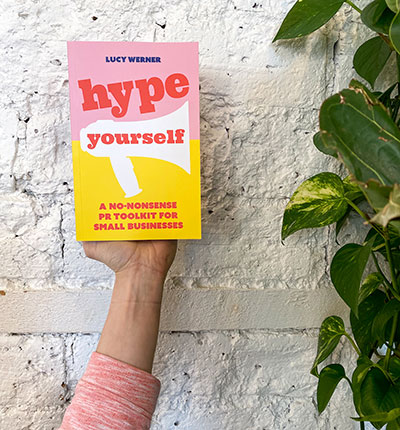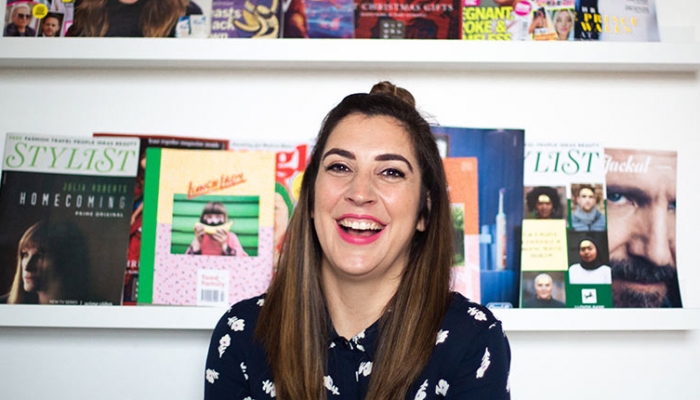A hyped-up spotlight on Lucy Werner, author of Hype Yourself
For no-nonsense tips on how to hype up your business, Lucy Werner is here to help. Founder of The Wern and author of Hype Yourself: A no-nonsense DIY PR toolkit for small businesses, Lucy wants to share her wealth of PR and comms experience with people just starting out with public relations, as well as PR book charts too often dominated by male writers.
With so much having changed within the industry and across the globe since the original publication of the book, Lucy tells us the extra advice she would give if she could add another chapter, and what have been the main challenges for her as a PR working through lockdown.
What inspired you to write the book?
A lot of PR books are written by male journalists-turned-PR-experts. I wanted to explain the strategy behind a PR campaign based on my agency experience as well as represent the female PR folk out there. The PR industry is made up of nearly two-thirds women, but this isn’t represented in the Amazon PR book charts.

In light of how the PR industry has had to adapt in light of the current health pandemic, what would you add if you could include another chapter?
I lightly mention crisis PR in the book and for many businesses, the pandemic did warrant a crisis PR response. I would actually borrow an internal mantra from Mailchimp: ‘Listen Hard, Change Fast’. I would also add that keeping open, honest and regular communication is key. Getting ahead of consumer backlash is always the one. We don’t mind mistakes, but we do want people to own them. And talk through how you are dealing with them, even if it’s just a holding note or message while you figure out a solution – say something.
I also think that beyond the health pandemic, it is especially important for businesses that have now woken up to unconscious bias in their communications. We have learnt a lot in the aftermath of George Floyd, but being actively anti-racist needs to be more than just a black square. It feels like a pivotal moment that must maintain momentum. If I was to write it again, I would definitely look to include more information from a diversity and inclusion expert to help inform businesses of practical steps they can take to not just be anti-racist but to consider all aspects of inclusivity.
How has the COVID-19 impacted your own day-to-day life and work in the industry?
In all honestly, the changes I have made have been my own choice rather than what has been put upon me, such as running ‘Pay what you can afford’ lunchtime workshops. I run my agency from my garden office and we have both PR and a branding side. There was definitely an initial hit and we lost a few projects but I have deliberately moved away from the traditional PR agency model which I don’t think serves the small business and entrepreneur community as well. It means that a lot of the PR work I do is split across workshops, lecturing, coaching as well as direct consultancy work so I have a lot of flexibility in income while I juggled lack of childcare.
What would be your first tip for small businesses looking to start putting a PR strategy together in-house in the current climate?
I walk you through a PR strategy in the first chapter of my book and you can download a free PDF template to complete. But the biggest tip I would give from that as a takeaway is, don’t start with the places you want your press coverage to appear. Start with what your business objectives are and tailor the PR accordingly. It may be that you need to focus on more digital marketing than publicity if your budget is tight.
For you, what are the main advantages for businesses doing their own publicity, rather than bringing in an external PR agency?
No publicist is ever going to have the same passion and knowledge about your business as you do. For me, there is a unique magic energy in the way that business founders are able to tell their own story.
Are there any campaigns you’ve seen from small businesses you’d pinpoint as great examples of no-nonsense PR?
I always cite the two women behind Squiggly Career as an excellent example of a service business smashing their personal branding. The rise of the personal brand has been hard to ignore, particularly during the pandemic and I definitely believe they give straight, no BS advice.
During the pandemic, there were some amazing business pivots from businesses like Crosstown Doughnuts who were also co-founders of independent delivery platform Slerp. Cat Food Cakes, who read my book, also smashed it with her own PR and bagged herself a prime-time slot on the BBC talking about her own business pivot. The sales from this spot of press coverage helped cover her business costs for the following few months!
As someone who trains, blogs, speaks and writes on the subject, do you think anyone can pick up the basics of PR?
Yes – I do. PR isn’t rocket science. At a basic level, it’s finding creative ways to tell a good story. I think it’s a myth that you need loads of great journalist contacts. From my own experiences, and that of people I teach to do it for themselves, the people who succeed are the ones who know how to get straight to the matter at the right time!
You’ve worked with big brands during your time in PR as founder of The Wern – how did you get your own start in PR/what attracted you to the industry?
My older brother helped out Way To Blue with their I.T. when they were based in Broadwick Street and focused only on music online PR. He managed to get me a work experience placement when I was 17 and I fell in love. Even though I was doing the office donkey work, I was having a great time.
PR has a diversity problem – what can those working in the industry do to encourage inclusion on their teams and in their work with clients?
It needs to start from the top down. I know all too well from experience that junior staff fear rocking the boat by raising difficult questions. Senior staff need to be more vocal about this being important to them and inviting constructive feedback and input from their teams. More effort needs to be placed on recruiting work experience, PR apprentices and junior positions from a wider pool and, most importantly, paying them fairly.
When it comes to working with clients, a lot of white able-bodied folk still don’t have the language or confidence to communicate effectively in this area. I believe all communications consultancies have a responsibility to continually train and develop their staff in this area.
How have you noticed the relationship between PR and journalism changing during your career?
I think there is a lot more crossover between PR/journalism and marketing in general with the decline in print media, and the rise of digital media and the opportunities that come with that. I don’t, however, think this has changed the love/hate relationship between journalists and PRs. I just think there is maybe more empathy with people who straddle more than one vocation.
Hype Yourself: A no-nonsense DIY PR toolkit for small businesses is available on Kindle and in paperback on Amazon. Follow Lucy Werner on Twitter @LucyWern, on Instagram @wernchat and check out her work with The Wern on the website.



Leave a Comment